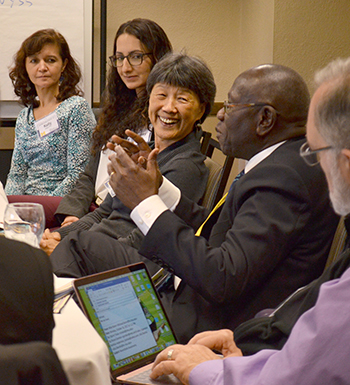This was case with Professor of Microbiology and Immunology Cheong-Hee Chang’s first visit to Uganda. Having been previously to Tanzania and Swaziland to offer guest lectures on immunology, Chang first traveled to Uganda early in 2016 to visit Kumi University, a small missionary undergraduate college. While there, a Kumi Vice Chancellor Young Gil Lee suggested they visit another institution, the much larger Mbarara University of Science and Technology (MUST), where Lee believed there was some ongoing research that could be of some interest.

“It took us eight hours to drive there for a visit that only lasted three or four hours. That was it,” said Chang. “But as an immunologist, I was very interested in what I saw.”
When Chang returned home, she reached out to a MUST researcher she’d met, Patrick Ogwang, and offered to help with his project, which involved a testing a tea product that seemed to help prevent malarial infections.
Less than two years year later, U-M was named a major institutional partner in MUST’s new Africa Center of Excellence for Pharm-Biotechnology and Traditional Medicine, a World Bank-funded project that explores how emerging biotechnologies might leverage herbal remedies to identify new drugs and therapies. Chang’s impromptu visit and subsequent relationship with MUST was the major catalyst for the partnership, which has already brought several researchers and leaders from MUST to Ann Arbor.
Chang welcomed a MUST group this spring that included Ogwang, PhD, a senior lecturer in the MUST Department of Pharmacy. Her lab also recently hosted a visiting PhD student from MUST – the first to study at U-M – and last month welcomed Joel Bazira, MBChB, MMED, PhD, the head of the MUST Microbiology Department.
“Dr. Bazira was with us for a very busy 17 days meeting with scientists within our department and others as well,” said Chang. “He would like to develop a training program for immunology back in MUST, and there were lots of discussions about how to help them get a program started.”
Other departments are getting involved, too. MUST colleagues have already connected with the U-M Center for Discovery of New Medicines, learned about the Life Sciences Institute’s extensive library of natural products, and exchanged research results with a group of UMMS Pharmacology faculty, including Chair Lori Isom.

“We’re excited in Pharmacology to reach out globally and begin building relationships with our Mbarara colleagues,” said Isom, PhD. “In places like Africa, there are many plant-derived medicines. What they lack are the resources to separate and test the individual compounds in order to develop new drugs that could benefit the whole country. There could be novel compounds that become beneficial on the global stage.”
That is precisely why the World Bank established the Pharm-Biotech center at MUST last year – to build training programs for the discovery and ultimate commercialization of medicines derived from African traditional remedies. As the school’s only U.S. partner institution, the University of Michigan stands to begin hosting more MUST scholars in the coming months and years. Leaders hope to send U-M students to Uganda as well.
“That kind of exchange is beneficial if we can students back and forth to train. I already have students who are very enthusiastic about the opportunity to visit there and work with them,” said Chang. “Things have developed very quickly. I never imagined anything like it on that first visit, but it’s wonderful. A big part of their initiative is really about improving training and education, and I’ve always been highly interested in teaching in African countries. That aspect is rewarding.”
